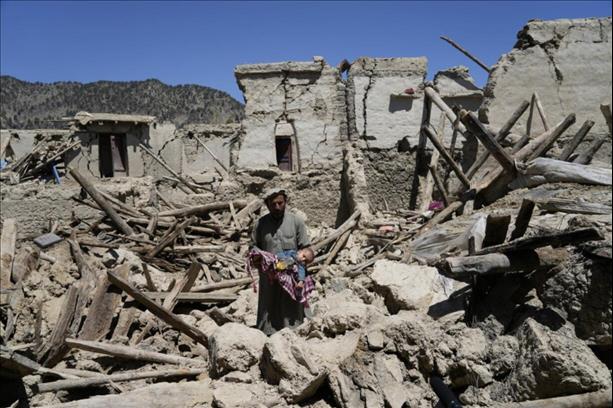
The Trauma Of Temblor: Afghanistan
Deep, deep, deep inside earth, the Indian plate collided with the Eurasian plate and a 6.1 magnitude temblor shook and shocked Afghanistan on June 22. The quake took at least 1,000 lives, leaving several others displaced. Over 10,000 houses were completely or partially damaged. The search for the dear ones from the debris fetched miserable results. In addition to Gayan, Barmala, Naka and Ziruk four districts of Paktika province, Spera district in Khost province was severely affected in the quake. A follow up tremor hit the area hard again on Friday, killing five more people. The disaster has mounted several challenges for the Taliban, who are already tormented by decades-long war, poverty, pandemic, hunger and economic crisis across the nation of 40 million. The disaster has placed Afghanistan once again in global attention for the wrong reason.
Following the quake, over 42 planes and a group of 15 trucks reached the quake-hit areas with housing and food items including rice, oil and flour. The Afghan government announced 100 million afghani, or $1.1 million. The locals started volunteering to collect money to support the affected families.
Despite their chilling political and diplomatic ties, Afghanistan drew immediate response from the countries in the neighbourhood and the west. The Taliban urged the US to unfreeze the foreign funds of Afghanistan and lift the stringent sanctions imposed on them following the deadly earthquake in the country. Qatar, Iran, Turkey, the United Arab Emirates, South Korea, Taiwan and Pakistan have extended support to Afghanistan. China announced humanitarian aid worth $7.5 million for the quake-hit nation. The UK announced £2.5 million in aid for Afghanistan. The local staff of the International Federation of the Red Cross facilitated the shelter, medication, water, sanitation, and other basic requirements of the people in Khost and Paktika. The Norwegian Refugee Council served the affected people and provided cash assistance to the affected families.
India responded immediately to stand by the ravaged state. India's response was prompt and timely. A technical team was sent by India to coordinate the distribution of humanitarian aid across Afghanistan. India has sent 27 tons of emergency relief materials including blankets,bags, sleeping mats, tents and sleeping bags. Despite India pulled back her diplomatic missions from Afghanistan, India's commitment to the people of Afghanistan can be found in her actions.
“India sent next shipment of 3000 MTs of wheat today to Afghanistan. Our commitment to provide humanitarian assistance to the Afghan people remains steadfast. As on date, India has successfully completed shipment of 33,500 MTs of wheat to Afghanistan in partnership with WFP,” India's Ministry of External Affairs stated after the quake.
Earlier, India requested Pakistan in October for her land transit facility to send 50,000 tonnes of wheat to Afghanistan. Islamabad took more than a month to send a positive response on this. India and Pakistan, the two sides arranged the transportation of the aid from India. Fifty trucks carried the first consignment of 2,500 metric tonnes of wheat to Jalalabad in Afghanistan.
“In order to closely monitor and coordinate the efforts of various stakeholders for the effective delivery of humanitarian assistance and in continuation of our engagement with the Afghan people, an Indian technical team has reached Kabul today and has been deployed in our Embassy there,” the Ministry of External Affairs of India said in a statement.
India has affirmed that her commitment towards Afghanistan will be guided by its“historical friendship and special relationship with the people of Afghanistan.” On June 2, an Indian delegation led by Indian envoy JP Singh visited Kabul to monitor delivery operations of humanitarian assistance to Afghanistan. The delegation inspected the sites of Indian projects including Indira Gandhi Children Hospital, Habibia High School, Chimtala sub-power station and the food grain distribution center of WFP. India has signed an agreement with WFP for fair distribution of its 50,000 MT of wheat among the Afghans.
While in Kabul, J.P. Singh called on Taliban's acting Foreign Minister Amir Khan Mottaki and Deputy Foreign Minister Sher Mohammad Abbas Stanikzai. India refrained from dealing with Taliban directly but India held a dialogue with Taliban formally last year on 31 August 2021. Indian Ambassador to Qatar, Deepak Mittal, called on Stanikzai, then incharge of Taliban's Political Office in Doha.
Seismic waves created the Himalayas or the Hindu Kush. And the same waves turned lively villages of Patika into debris. Such Seismic movements may cause enormous destruction in Afghanistan in future. Located in the Hindu Kush region, Afghanistan is earth-quake prone. In this location, the Arabian, Indian and Eurasian tectonic plates. Prior to the quake, Taliban, the incumbent in Kabul was inundated by several challenges.
The disaster has mounted more challenges before the Taliban. The adminisgtration in Kabul has reasons to worry and measures to take.

Legal Disclaimer:
MENAFN provides the information “as is” without warranty of any kind. We do not accept any responsibility or liability for the accuracy, content, images, videos, licenses, completeness, legality, or reliability of the information contained in this article. If you have any complaints or copyright issues related to this article, kindly contact the provider above.






















Comments
No comment